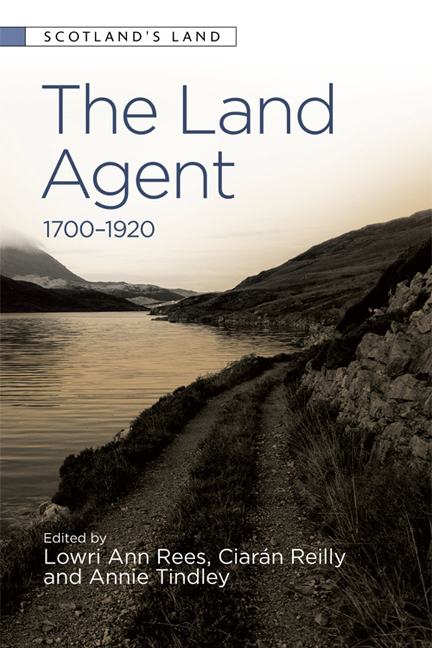Book contents
- Frontmatter
- Contents
- List of Figures
- Acknowledgements
- Notes on the Contributors
- Map of the British and Irish Isles
- Introduction
- Part I Power and its Constructions on Landed Estates
- Part II The Transnational Land Agent: Managing Land in the Four Nations and Beyond
- Part III Challenges and Catastrophe: The Land Agent under Fire
- Part IV Social Memory and the Land Agent
- 11 John Campbell (‘Am Baillidh Mor’), Chamberlain to the 7th and 8th Dukes of Argyll: Tradition and Social Memory
- 12 ‘Castle government’: The Psychologies of Land Management in Northern Scotland, c. 1830–90
- Postscript
- Index
11 - John Campbell (‘Am Baillidh Mor’), Chamberlain to the 7th and 8th Dukes of Argyll: Tradition and Social Memory
from Part IV - Social Memory and the Land Agent
Published online by Cambridge University Press: 11 August 2018
- Frontmatter
- Contents
- List of Figures
- Acknowledgements
- Notes on the Contributors
- Map of the British and Irish Isles
- Introduction
- Part I Power and its Constructions on Landed Estates
- Part II The Transnational Land Agent: Managing Land in the Four Nations and Beyond
- Part III Challenges and Catastrophe: The Land Agent under Fire
- Part IV Social Memory and the Land Agent
- 11 John Campbell (‘Am Baillidh Mor’), Chamberlain to the 7th and 8th Dukes of Argyll: Tradition and Social Memory
- 12 ‘Castle government’: The Psychologies of Land Management in Northern Scotland, c. 1830–90
- Postscript
- Index
Summary
The Cottar Tribe, who are the Locusts of the Land … they comprise the indolent, uncivilised and pauperism of the Estate … His Grace of Argyll never speculated money to such advantage as to get rid of them by all possible speed.
I would watch them and all those who are not industrious would most assuredly be deprived of their possessions. Nothing but harshness and dread I find will do, they are so naturally slothful and indolent.
I have daily, numerous applications for food … unless they work they must just starve.
INTRODUCTION
AT 1 P.M. ON a Saturday afternoon at the end of August 1872, on the island of Mull within a small, felt-roofed blackhouse in the Ardfenaig steading, a very tall and heavily built man who had been feared the length and breadth of the islands of Mull, Iona and Tiree, and who had lain stretched out on a bed for the previous two weeks, gasped his last breath and died, having collapsed earlier at the steading. So began the myth of a man still passionately spoken about today, 145 years after his death. Vivid oral traditions have survived about his life on Mull during his twenty-six years there and his eighteen years on Tiree as Chamberlain for the Duke of Argyll. He is regarded in oral tradition as being one of the most notorious chamberlains in Argyllshire, if not Scotland, during the nineteenth century. His name was John Campbell, a Gaelic speaker from the island of Islay (see Figure 8). He became Chamberlain of the Inner Hebridean islands of Mull, Iona and Tiree at the time the potato blight arrived in the 1840s, which had such devastating consequences for all who lived there.
Oral tradition relates that dogs howled all night the day before he died with a premonition of his imminent death and that maggots had infiltrated his body so that ‘he became alive like a maggoty sheep’. After he died, ‘animals broke their ties and the barking of the Ardfenaig dogs were heard in Ardtun’.
- Type
- Chapter
- Information
- The Land Agent , pp. 205 - 224Publisher: Edinburgh University PressPrint publication year: 2018



